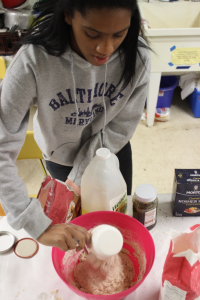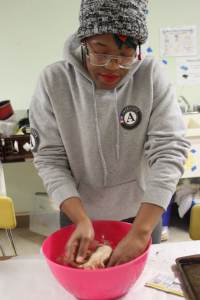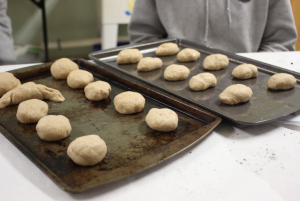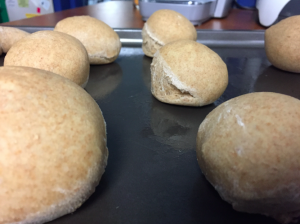From Yeast and Honey to Homemade Bread
In addition to being a working urban farm that produces and sells fresh, affordable produce, Real Food Farm is on a mission to bring environmental education to youth in Baltimore City. Our current team of Farm Educators is comprised of two astounding AmeriCorps members, Darian Closson and Omnia Azar.
What inspired you to apply for this position?
Darian: Before AmeriCorps, I was working as a temporary assistant at a daycare center for homeless children. When that position ended I knew that I wanted to continue working with children, and I wanted to find something where I could be outside because I’m an outdoorsy person. I was following the Farm on Facebook and I saw the position description and knew I wanted to apply, and the next day I went in for an interview.
Omnia: I was doing community gardening over at Perlman Place and was looking to transition because I was also employed in a temporary position that was close to ending. Raven, a former AmeriCorps member at the Farm, told me about the opportunity because she knew I liked working with children and was interested in farming, which is why I was doing community gardening. The education award was also very attractive, because I have student debt from undergrad and I want to go back to school for massage therapy. It’s very inspiring that AmeriCorps encourages professional development, which gives me the opportunity to be able to learn, teach others, and develop myself professionally.
What programs do you coordinate?
Omnia: Life Skills is one of the special education classes at REACH! Partnership School where students learn a variety of life skills. We give them a component teaching them about gardening, growing things, where plants come from, what harvesting is, and food production. We’re always looking to do different things– we’ve done hydroponics, the students harvested beets and made beet and apple juice, and we made seed bursts, which I’m really excited to see how that turns out in the spring when we see the flowers crop up because it will be right outside their classroom windows. We had a trial and error experiment with composting– we tried to have them do their own little composting bin with worms, but it had too much ventilation so it dried up.
Darian: We have another program, Youth Crew, which is an internship program for high school students that meets once a week. We focus mainly on herbalism and food justice, and I get to guide the kids as they start seeds, plan for the garden and what we should grow in our education tunnel hoop houses. Some of our recent projects included painting crop signs, starting seeds in the greenhouse, and making herbal tea. One of the kids was really excited to learn that chamomile is an herb that can be used for relaxation and aid with anxiety. They’re all really interested in learning about the different properties of the herbs we grow and what sort of effects they have, and what they can be used for, so we like to explore that a lot in our lessons. We do make and takes almost every time we meet, so they always have something that they are able to take home with them.
We’re going to do a project that the Life Skills and Youth Crew have both done. What is it?
Darian: We’re going to be making bread today, and the way we start that off with our students is by talking about the ingredients that go into the bread that we eat. I ask the students about what ingredients they need to make bread, and they typically know wheat and flour, but they don’t typically know anything about yeast. Then we give a little lesson on yeast and active cultures before we get started.


Our recipe is really simple: it takes 1 3/4th cup of water, 2 tablespoon of honey, and then we pour the yeast in. It takes about 5 minutes for the yeast to activate, which allows the bread to rise and be like bread. While it’s sitting, we measure out the other ingredients: 4-5 cups of flour, and we like to mix wheat and white flour, so typically we do 3 cups of wheat and 2 of white flour; then we measure out 1 teaspoon of salt, ¼ cup of oil.


After the five minutes, we add salt and the oil, and tell the students we add the flour in one cup at a time. We like them to see the process of the dough becoming denser and denser, so we have them add it in slowly so they can see the process. Eventually, I tell them not to use the spoon any more and use their hands to knead the dough. You need to lift and fold the dough until it feels stuck together and is not sticking to your hands any more. We give everyone a turn to knead the dough, and then everyone takes a piece of dough and molds it into whatever shape they want. We pre-heat the oven to 375 and then one of the kids pops the bread into the oven for 10-15 minutes. That’s when we talk about the process of wheat becoming bread.
Omnia: One of the main reasons that we decided to introduce breadmaking as a lesson was to extend the notion of growing your own food and now you’re making what you’re eating. You can grow what you can eat, and you can make what you eat. Just also knowing and being aware of what’s going into what you’re going to be eating. We want to empower them with the knowledge that if they ever need bread, they know how to make it– if you ever want to, you know how to make it.
Darian: Also connecting things back to where things come from, because a lot of the time people are disconnected from where things come from. People don’t really think of bread as being a plant based food, but it is.
Omnia: We talk about how the things that went into the food grew and how we got here, from growing to processing to turning it into food.
Darian: It’s also just fun to make bread, because at the end the students get to eat what they make.
Omnia: They also really liked to make butter because they got to shake it, shake it, shake it! The butter was just whipping cream that we put into mason jars, and the students took turn shaking it.
Where did you come up with the idea to make bread?
Darian: I learned this bread recipe at a conference– the ABCs of Farm Based Education at Shelburne Farms, a 3 day conference in Vermont. We learned all these farm based education activities and sent us back with this big book of farm based activities. We actually had the opportunity to make bread for our dinner one night at Shelburne, and it was a great activity that I knew I wanted to take back to the kids. It was great because I got to go for free as part of my professional development as an AmeriCorps member, and Omnia will go in March. It was also a great opportunity to network with other farm based educators, which I didn’t realize was a thing. I was actually the only person there that came from an urban farm, and everyone was interested to learn about our urban farm operation. They didn’t really have an understanding of how an urban farm works. A few weeks ago, people from Shelburne came out to see Real Food Farm and they were so excited about what we were doing in our urban farm.
Omnia: And they gave us some really good cheese! But the most impactful thing was that it gave us the opportunity to see the Farm through fresh eyes. We see it each day when we come in to serve, so we might forget sometimes how unique it is.
BECOME A FARM & CONSERVATION EDUCATOR!
We’re hiring another member of our Farm Education team! You can join Darian and Omnia and make an impact on Baltimore’s youth by applying to become our Conservation Educator serving as an AmeriCorps member at Real Food Farm and with our Baltimore Conservation Leadership Corps.
